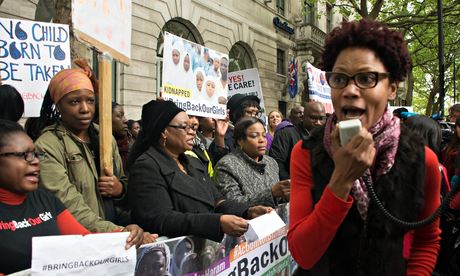
A protest outside the Nigerian embassy in London: David Cameron rejected a suggestion that the authorities had failed to lift a finger to help find the girls. Photograph: Michael Tubi/Demotix/Corbis
Britain is offering to step up its military assistance to Nigeria by sending surveillance aircraft and an intelligence team to help the authorities track down the kidnapped schoolgirls.
As he rejected claims that the Nigerian government had failed to do enough to help find the missing girls, David Cameron said Britain should be willing to offer help across a range of fronts to help protect schools in the country.
The prime minister told MPs: "I can announce that we have offered Nigeria further assistance in terms of surveillance aircraft and a military team to embed with the Nigerian army in their HQ and a team to work with the US experts to analyse information on the girls' location.
"This was an act of pure evil. The world is coming together not just to condemn it but to do everything we can to help the Nigerians find these young girls."
Downing Street sources indicated that the British surveillance aircraft would not be drones. The military team would work with their Nigerian counterparts at the country's military HQ to help co-ordinate and analyse intelligence.
The prime minister rejected a suggestion by Tom Clarke, the former Labour minister, who said the Nigerian authorities had failed to lift a finger to help find the schoolgirls. A group of about 130 of the kidnapped girls appeared earlier this week on a video released by the terror groupBoko Haram.
Clarke, who is a respected expert on international development, asked the prime minister: "While I welcome the efforts to rescue the schoolgirls in Nigeria, will the prime minister agree that the Nigerian government hasn't lifted a finger to protect its own citizens in the north as they were attacked by Boko Haram?"
Cameron replied: "I don't think his description of the Nigerian government is entirely fair. They do face a very vicious terrorist organisation in terms of Boko Haram.
"They are investing in and training their armed forces in counter-terrorism abilities. We have worked with them on that and we are willing to do more work with them on that, particularly if we can make sure proper processes are in place for dealing with human rights issues."
But the PM said Britain should be prepared to provide more than military assistance. He said: "We should help across a broad range of areas – not just counter-terrorism, surveillance and helping them find these people but also working with the global fund promoted by [Gordon Brown] in terms of protecting more schools." SOURCE
 Welcome to Justin Kingland's Blog News
Welcome to Justin Kingland's Blog News

No comments:
Post a Comment